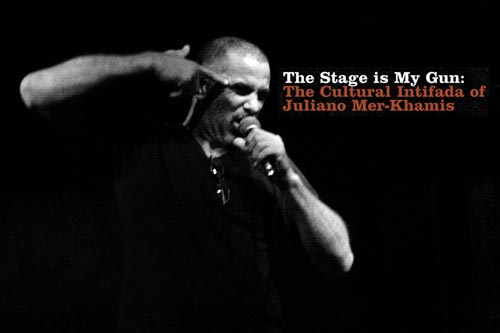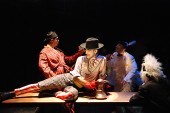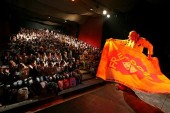The Stage is My Gun: The Cultural Intifada of Juliano Mer-Khamis
by Olivia Stransky / January 7, 2012 / 3 Comments

Juliano Mer-Khamis, founder of The Freedom Theatre, was killed April 4, 2011. The Freedom Theatre is a community theatre that provides opportunities for the youth of the Jenin Refugee Camp, using a creative process as a model for social change. Photo: Anne Paq/Activestills.org
Jenin, January 2011: A Professional Theatre in Occupied Palestine

'It will be our biggest scandal yet, I hope.' - Juliano Mer-Khamis on his production of Alice in Wonderland. Photo: Courtesy of The Freedom Theatre
Onstage, Freddy Mercury’s “I Want to Break Free” blasts as the Mad Hatter leaps onto a table. Clad in tights and red leather, this curious Mad Hatter pulls Alice up for a decidedly un-Disney tango. Later the caterpillar dangles, upside down, from a silk scarf as he tells Alice that she must save Wonderland by marrying a man her father has chosen. The Red Queen screams and sings, the stage revolves, and the captivated audience watches. After the curtain drops the director, Juliano Mer-Khamis, walks on stage to tumultuous applause, surrounded by the actors he has trained, supported, and loved. This risqué, polished production ran in January 2011. Where? A refugee camp in occupied Palestine called Jenin that, only a few years earlier, had been the site of a battle that killed more than fifty Palestinians and left 4,000 homeless.
A few months later Juliano and his last-year students meet in The Freedom Theatre’s acting school. The time has come for the students to begin working on their final production. It is not hard to imagine why Juliano chose Frank Wedekind’s Spring Awakening. His students are Palestinian men and women who have grown up surrounded by propaganda, misinformation, and a constantly changing country—just as Wedekind’s characters struggle with coming of age in a repressive society. While theatre may seem like an entertaining distraction from day-to-day confusion, Juliano said his motivation to create the theater was to provide the opportunity for Palestinians “to develop the skills, self-knowledge and confidence which can empower them to challenge present realities and to take control of their futures.”
- Juliano Mer-Khamis
- 1958: Born on May 29
- 1978: Dismissed from the Israel Defense Forces
- 1984: Appeared in first feature film
- 2003: Directed first documentary, Arna’s Children
- 2006: Founded The Freedom Theatre
- 2011: Murdered in Jenin, occupied Palestine
However, the production of Spring Awakening that Juliano and his students had planned was never completed. On April 4th, 2011 while leaving the theater with his one-year-old son and pregnant wife, Juliano was shot five times by a masked gunman. He was pronounced dead upon arrival at Jenin Hospital.
Henry Reese, co-founder of City of Asylum/Pittsburgh, met Juliano through a Ford Foundation Space for Change Conference, a grant-giving organization which “works with visionary leaders and organizations to change social structures and institutions.” On Juliano’s death, Henry said “This risk was palpable in the work Juliano was doing. He brought together young men and women, angering fundamentalist extremists who fire-bombed his theater. In a context of violent politics, he used theater as a means of liberation and understanding, both as an acting technique, and in his choice of plays.”
The images and reports from Palestine that reach the United States testify that Palestine lacks water, medical assistance, schools, and economic opportunity. While many media outlets report that all of these things have become increasingly difficult to access in Palestine due to the Israeli government’s continual aggression and appropriation of resources, one effect of Israeli occupation, however, is neither visible in photographs, nor mentioned in brief news reports: The cultural occupation and repression of Palestine.
“Art, in our case, can combine, generate, and mobilize other aspects of resistance… I’m not doing art for the sake of art.” – Juliano Mer-Khamis
The troubled history of The Freedom Theatre exemplifies this oppression. In 1987 Juliano’s mother created The Stone Theatre, a place for children to take part in drama therapy. In 2002 The Stone Theatre was bulldozed by the Israeli army. The Freedom Theatre was built in 2006 to take the place of The Stone Theatre, and since Juliano’s death, the building has been raided three times by Israeli military forces. Most recently, on December 29th Zakaria Zubeidi, co-founder of the theatre, had his amnesty revoked by Israeli authorities and was incarcerated. The reason for the Israeli government’s animosity towards such a venue can probably be attributed in part to the call by some Palestinians, including Juliano, for a cultural resistance to physical and political oppression in all its forms.
- Jenin Refugee Camp
- 1953: Camp established by United Nations Relief and Work Agency
- 2002: April 1-11, Israel Defense Forces occupy camp:
- – 52 Palestinians and 52 Israelis killed
- – 140 buildings destroyed by fighting
- – 435 families left homeless
For Juliano the theatre was a substitute for violence, both personally and for his students. In the 1970s he served as a paratrooper for the Israeli army. However in 1978, while stationed in Jenin, Juliano was ordered to pull an elderly man out of a car. He refused to touch the old man despite the continued, furious orders of his commander, and was arrested and discharged. After this, Juliano turned to acting and appeared in several major Israeli films including Salt of This Sea (2008) which was nominated for an Academy Award for Best Foreign Film. This was the end of Juliano’s support for Israeli occupation, and for a long time he worked solely as an actor.
However at some point art became a means to an end for Juliano, as he expressed in 2006: “Art, in our case, can combine, generate, and mobilize other aspects of resistance. All I care about is resistance. I’m not doing art for the sake of art. I think art can generate and motivate and combine and create a universal, liberated discourse. This is my concern.”
Continue reading this article on page 2






3 Comments on "The Stage is My Gun: The Cultural Intifada of Juliano Mer-Khamis"
Julaino Mer Khamis dedicated his life to truthful expression so I am so sorry that this article about his life and death has been turned into another anti-Israel propaganda piece. It does not even include the fact that he was in fact killed by Palestinian gun man.
Juliano Mer Khamis is a name that I hope will not be forgotten, his work must go on.
We are a gaggle of volunteers and starting a new scheme in our community.
Your website provided us with useful info to work on. You have performed a formidable process and our whole community might be thankful to
you.